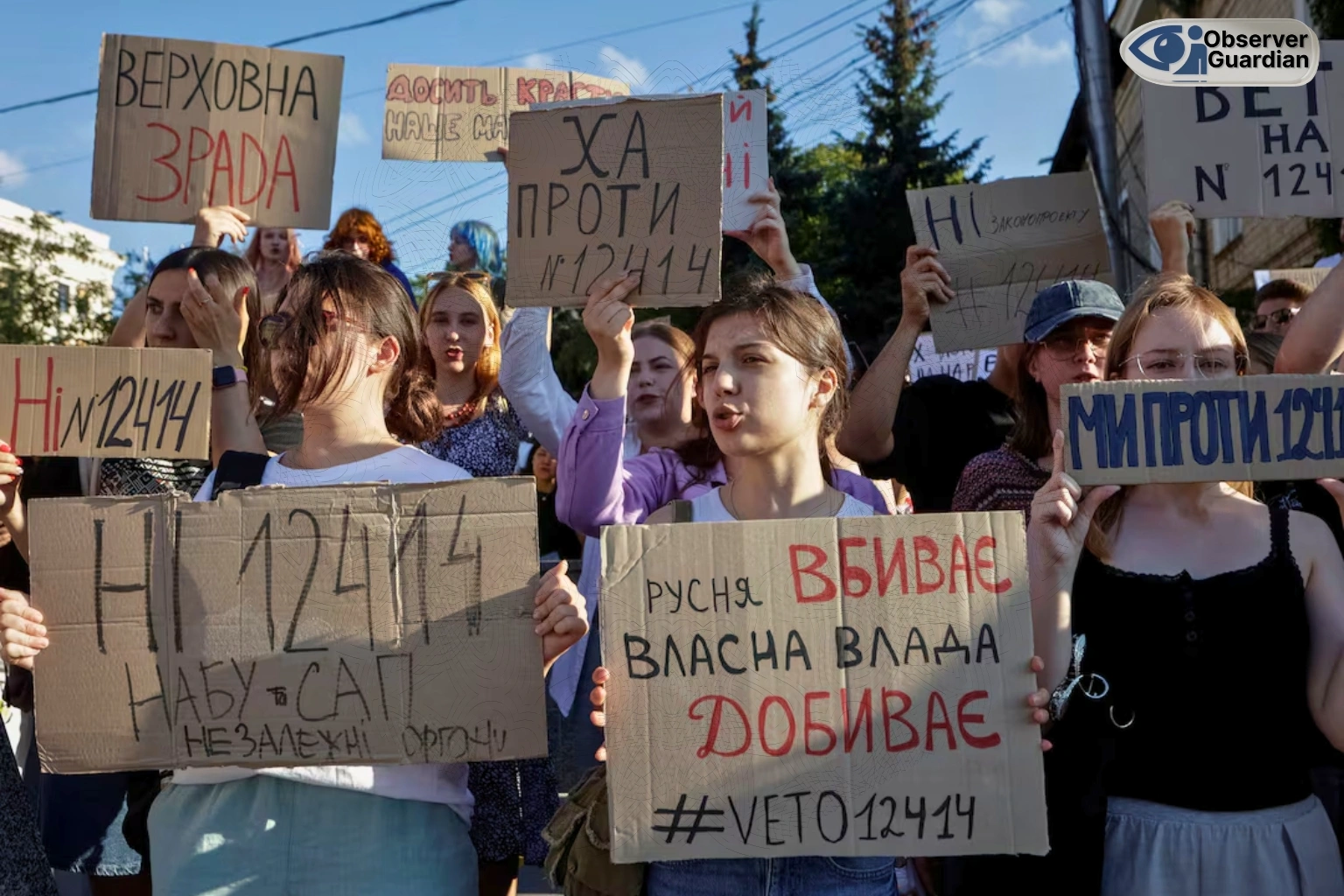The world was reminded of the continuous democratic struggle of Ukraine amid the destruction of war by the huge wave of corruption protests that stunned the government in July 2025. When the legislature of Ukraine approved a contentious law that destabilized the freedom of two important anti-corruption groups; the National Anti-Corruption Bureau of Ukraine (NABU) and the Specialized Anti-Corruption Prosecutor’s Office (SAPO), protests broke out, spreading to main towns like Kyiv, Odesa, Lviv, Kharkiv, and Dnipro. Activists, assessed at between 10,000 and 16,000, raised serious concerns about reversing democratic reforms and risking Ukraine’s growth towards European integration. The delicate balance between political manoeuvring and public resilience in the country’s wartime fight against corruption was challenged by President Volodymyr Zelenskyy’s immediate reversal of course and introduction of a new law to restore these agencies’ freedom.
The Law that Sparked the Outcry
The protests were directly attributable to the passage of Bill No. 12414, passed unexpectedly on July 22, 2025, reorganizing SAPO and NABU oversight by putting them under the Prosecutor General’s supervision. President Zelenskyy appoints the Prosecutor General of the country, a person viewed as politically tied to him. Because these agencies played a major role in investigating corruption cases, including those involving influential political figures, they lost autonomy and authority as a result. Critics warned that the law weakened efforts for transparent governance by allowing politicians much more interference in anti-corruption procedures. These adjustments, perceived widely as politically motivated attempts to intimidate agency employees while supposedly investigating minor violations, interestingly followed police-led raids on NABU offices. Zelenskyy’s ruling party along with some opposition groups supported the bill, yet liberal parties and civil society strongly opposed it. As a result, the political cracks in Ukraine were exposed.
Mass Protest Reflects Civic Resilience
The law’s passage triggered the first major anti-government protests in Ukraine since the start of the Russian invasion in 2022. With slogans like “Hands off NABU“ and “Shame”, activists gathered outside Kyiv’s Ivan Franko Drama Theatre and in other cities. The majority of protesters were young people, many inspired by earlier democratic uprisings such as Euromaidan, though for many this was their first time participating in large-scale protests. In a show of democratic resolve, experts, military workers, IT specialists, and civil society groups organized together. The protests remained peaceful but powerful, emphasizing the need for Ukraine to protect democratic institutions at home with the same strength as its battle for sovereignty abroad.
Political and International Pressure Mounts
Global partners, such as the European Union and Western governments, who view strong anti-corruption institutions as vital to Ukraine’s reforms and a prerequisite for ongoing support, voiced their disapproval. Concerned about the bill, EU Enlargement Commissioner Marta Kos termed it a “serious step back” for Ukraine’s reform program. Western representatives warned that weakening SAPO and NABU could jeopardize Ukraine’s credibility and assistance. Zelenskyy announced that a new draft law would be introduced to restore the independence and authority of the anti-corruption institutions while protecting them from outside influence, despite initially defending the bill as removing “Russian influence.”
Legislative Reversal and Democratic Gain
Bill No. 13533, which reversed the changes made by Bill No. 12414, was presented and passed shortly after President Zelenskyy’s proclamation. The restoration law was approved by the Ukrainian parliament on July 31 and rapidly signed into law. By re-establishing their institutional independence, the measure protected NABU and SAPO from excessive political influence and confirmed their full operational authority. Activists who gathered outside parliament with the motto “The people are the power”, a strong affirmation of accountability, celebrated the legislative reversal. The law, according to NABU, is a victory for the state’s anti-corruption institutions and a defense against political interference.
Challenges of Reforms within War
Ongoing war circumstances, which often create an atmosphere that encourages corruption and erodes the rule of law, make it more difficult for Ukraine to uphold reforms. Concerns for accountability and transparency may be overshadowed during times of war by relentless security challenges. Moreover, some government officials have tried to use the conflict as an excuse to stall or weaken reforms. The protests in 2025, however, show that the public is becoming increasingly determined that democratic values be upheld even during crises. Both Ukraine’s internal stability and its long-term integration with democratic Europe depend on the protection and consolidation of these institutions, according to global experts and organizations.
Suggestions: Strengthening Ukraine’s Anti-Corruption Framework
Ukraine must ensure legal independence and lasting constitutional protections for organizations like NABU and SAPO in addition to temporary legislative changes if it hopes to build durable resistance to corruption. In order to offer both practical support and political pressure, cooperation with international partners like the EU, OECD, and Transparency International should be expanded. Moreover, the government should fund initiatives that support civil society, strengthen protections for whistleblowers, and increase public awareness of the importance of accountability. To prevent corrupt officials from escaping justice, fairness and efficiency should be prioritized in reforms to the judicial system and law enforcement. Ultimately, despite ongoing wartime challenges, Ukraine’s anti-corruption efforts can stay on track with determined political will at the highest level, active civic engagement, and transparent international cooperation.
The anti-corruption marches signify a turning point in Ukraine’s democratic history in July 2025, demonstrating how strong public support and international attention can resist efforts to undermine governance during crisis. Following the protests, President Zelenskyy reversed his legislation, highlighting the delicate political balancing act between democratic accountability and wartime leadership. Ukraine has proven its resilience and commitment to democratic governance by upholding the independence of anti-corruption institutions despite internal pressures and ongoing war. The sustainability of these reforms is crucial to safeguarding Ukraine’s democratic future and its position in the European community as the nation continues its fight for justice and reform.
Disclaimer: The views and opinions expressed in this article are exclusively those of the author and do not reflect the official stance, policies, or perspectives of the Platform.







